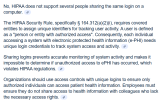"shared login"...meaning..several different people logging into the same computer as the same user...is frowned up.
HIPAA (and most other compliance standards) want to see a unique login "per user".
You can have several people log into the same computer...at different times....each with unique logins.
Bob logs in as Bob
Julie logs in as Julie
Brenda logs in as Brenda...etc.
But you should not have Bob log in as "FrontDesk"...and Julie also log in as "FrontDesk".....etc.
M365 Business Premium supports "Shared Computer Activation"...so several different people can uniquely log into the same computer...and that Office install will properly support each users profile.
This is a fact driven by HIPAA, not opinion.
View attachment 17729

